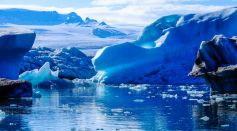Tags: Climate change

'Tightening The Net': New Report Warns About 'Net Zero' Carbon Targets Distracting the Public

Major Atlantic Ocean Current System at Its Weakest in Over 1,000 Years, Poses Risks of Collapse Due to Climate Change

Targeting 'Super-emitters' To Combat Climate Change; How Handful of Power Plants Create Most Carbon Emissions from Electricity Generation
Bees, Pollinators, Pollination Under Threat Due to Environmental Pressures: Analysis Cites Agrochemicals Including Pesticides Among the Causes

Carbon Dioxide Decline 34 Million Years Ago Caused Earth's Drastic Climate Transition and Formation of Antarctica

EEI: Earth's Energy Imbalance is Human-Induced and Less Than 1% Natural, Study Says

NASA-DCOTSS Mission Explores How Summertime Thunderstorms Influence Climate Change Using ER-2 809 Airplane

14,000 Scientists Declare Climate Emergency, Continued Negligence to Climate Change May Bring "Untold Suffering"
Thousands of Dead Baby Flamingos Settle Down in Turkish Lake Bottom Due to Devastating Drought

Global Biodiversity Fails Again! Bioscience Experts Show How We Underestimate Self-Inflicted Mass Extinction

Arctic's Shorter Shipping Route Risks Our Changing Climate; Could Melt the Polar Region Faster Than Expected
Earliest Land Plants 400 Million Years Ago Possibly Modified Earth's Climate Regulation

NASA, Purdue Team Fly Miles Above Earth up to 70,000 Feet, to Study Data on North American Monsoon Season
Ancient Ostrich Eggshell Shows Proof Homo Sapiens Experienced Climate Change 250,000 Years Ago
Climate Change May Have Affected the Body and Indirectly the Brain Size of Prehistoric Humans, Study Found
Ancient Humans Had Bigger Bodies to Combat the Cold; Will Changing Climate Shrink Present Humans?

Billionaires Elon Musk, Jeff Bezos, Richard Branson Cannot Live in Space; Will Money Save Them from Climate Change?

Sea Level Rise: Moon Causes US Coastal Flooding That May Worsen in the Mid-2030s
Male Dragonflies Experience 'Wing Pigmentation' in Regions with Hotter Climates

Earth's Cryosphere Shrinking by 33,000 Square Miles Annually: How Does Ice Sheet Melting Impact the Planet?
Most Popular

Coral Bleaching Crisis: How Ocean Warming Threatens Marine Ecosystems Worldwide

Can EV Batteries Be Recycled? How Lithium Recovery Supports Sustainable Batteries

NASA Aurora Research Reveals How ESA Space Weather Teams Use Satellite Aurora Imaging and Ground Sensors

V2G Technology: How EV Energy Storage Utilizes Smart Grid and Renewable Energy Integration





